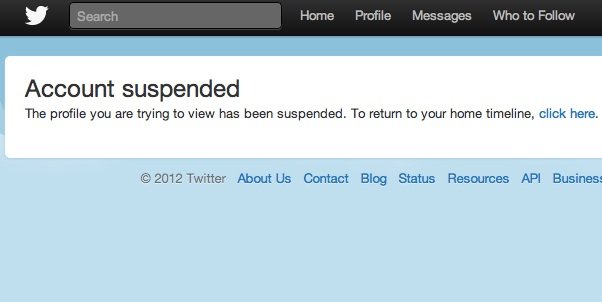
Twitter is facing a user backlash after suspending the account of journalist Guy Adams, who had criticized NBC Universal’s coverage of the Olympic Games.
NBC Universal had complained that Independent newspaper correspondent Guy Adams had posted the email address of one of its executives.
But Guy Adams has alleged the complaint was only made after Twitter had alerted NBC to his message.
Twitter said it “does not actively monitor users’ accounts”.
However, the social network refused to discuss Guy Adams’s case, saying “it was company policy not to comment on individual users” for privacy reasons.
Twitter formed a partnership with NBC ahead of the Games to create a page highlighting messages from NBC personalities, athletes and fans during the event.
The broadcaster paid $1.18 billion for the US broadcast rights to the Olympics.

Several users have retweeted the executive’s email address in protest at the suspension.
Guy Adams – who is based Los Angeles – posted a message last Friday criticizing NBC’s decision to broadcast the Games’ opening ceremony with a time-delay in order to target a prime-time audience.
On the US’s east coast it was shown with a three-and-a-half hours delay, on the west coast the gap was up to six-and-a-half hours.
This caused problems for users who enjoy swapping comments about major events on social network sites.
“The man responsible for NBC pretending the Olympics haven’t started yet is Gary Zenkel. Tell him what u think,” Guy Adams tweeted, referring to NBC’s Olympics president.
He also included Gary Zenkel’s business email address in the message.
Guy Adams said when he checked his account on Sunday he had received a message saying it had been suspended.
NBC Sports subsequently released a statement confirming it had called for the action.
“We filed a complaint with Twitter because a user tweeted the personal information of one of our executives,” it said.
“According to Twitter, this is a violation of their privacy policy. Twitter alone levies discipline.”
Guy Adams then published an article saying a Daily Telegraph journalist had forwarded him an email from NBC.
He quoted an NBC spokesman as saying: “Our social media department was actually alerted to it by Twitter and then we filled out the form and submitted it.”
Twitter’s terms and conditions say posting another person’s private and confidential information, including “non-public, personal email addresses” is a violation of its rules.
But Guy Adams said he had done nothing wrong, as the address he had used was a corporate one based on the same system used by NBC’s other employees and could easily be worked out by “anyone in possession of 30 seconds of free time and access to Google”.
Many Twitter users have come out in support of Guy Adams.
“Scandal that someone should be banned for voicing an opinion,” tweeted London-based Nicholas Pritchard.
“I think Twitter’s suspension of Guy Adams’ account hurts its own brand. A lot,” posted George Maschke from the Netherlands.
Among the critics were others involved in the media industry.
“Twitter’s suspension of @guyadams jars with company’s claim to be the free speech wing of the free speech party,” wrote the Guardian‘s special projects editor Paul Lewis.
“I wouldn’t have posted the email address. But Twitter’s removing his account was outrageous,” added Dan Gillmor, from the Arizona State University’s school of journalism.
Several users posted internet links to websites that had previously published Gary Zenkel’s contact details. Some also reposted the executive’s email address to Twitter.
NBC has highlighted that a record 40.7 million people watched its coverage of the opening ceremony, saying it was “a great early sign that our strategy of driving people to watch NBC in prime-time is working”.